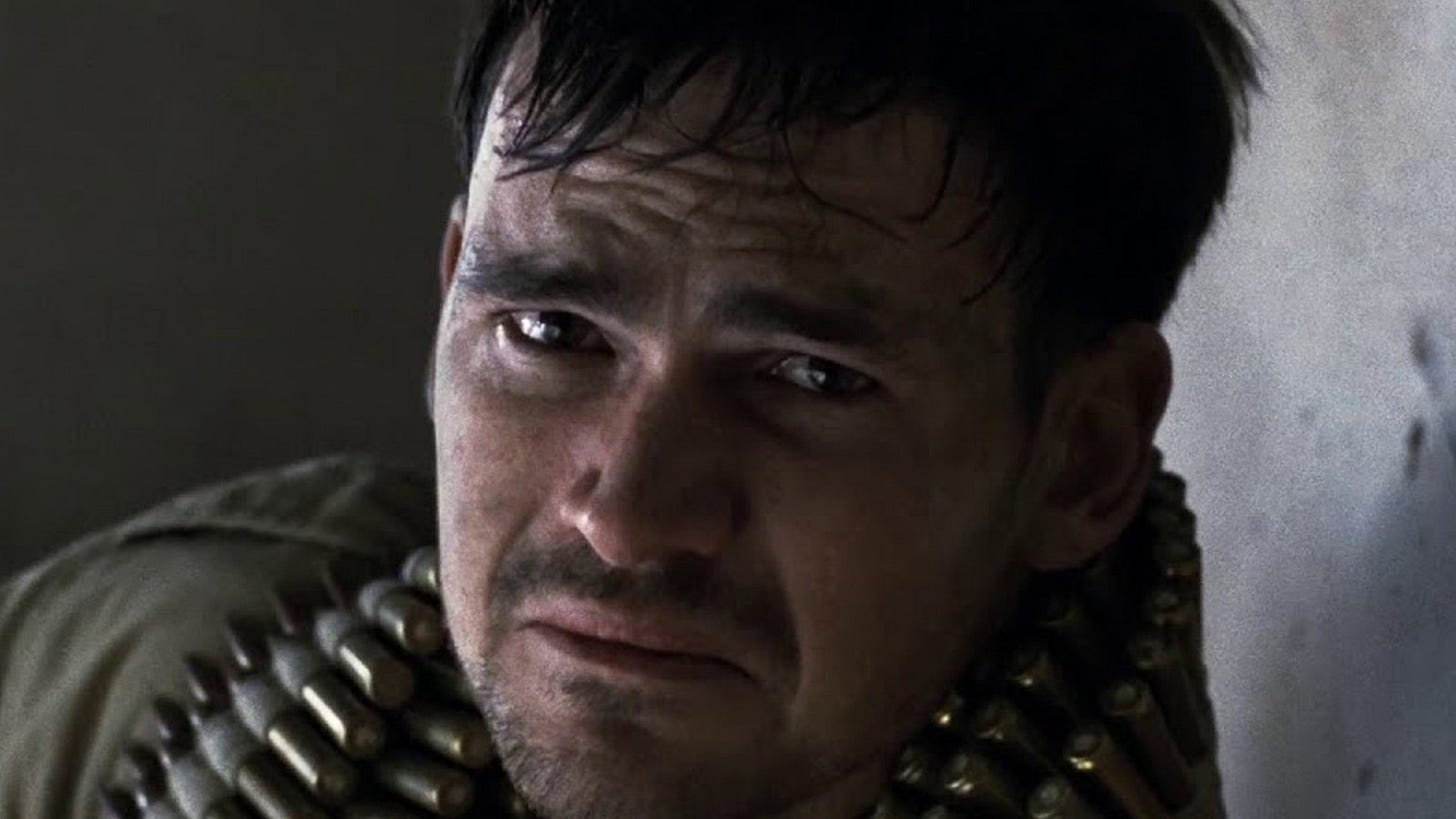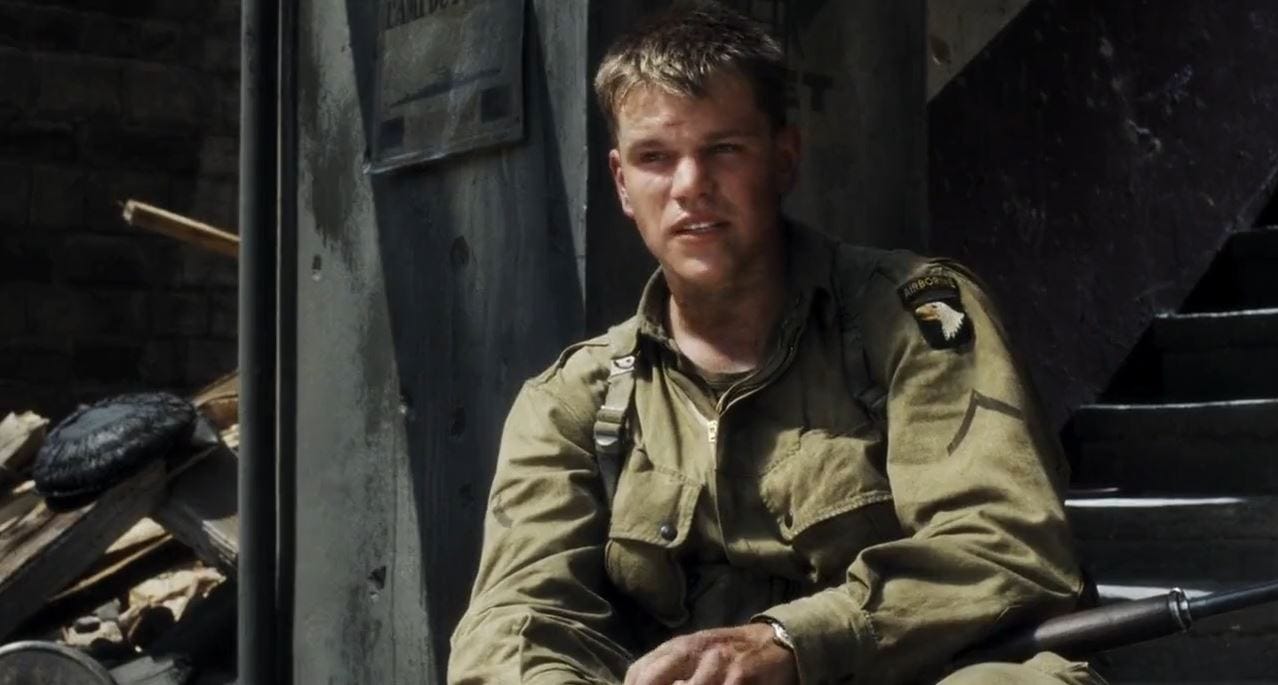1998 in Review: "Saving Private Ryan"
or The Trial of Cpl. Upham
Saving Private Ryan opens with 25 minutes of the most gruesome, unsparing, realistic war action you’re ever likely to see, but it’s a little scene in a bombed-out building two hours later that haunts my nightmares. It’s the climactic battle scene in which the American soldiers are defending a bridge from the Germans. Private Mellish (Adam Goldberg) is engaged in hand-to-hand combat with a German soldier on the second floor of a building where he was taking aim at the enemy from high ground. As they roll around the floor, Mellish removes his knife from its sheath, but the German somehow rips it away from him and manages to pin Mellish to the floor. He brings the knife down to Mellish’s chest. For a brief moment, he summons the strength to resist, but it’s too late. Mellish realizes he has lost, and as the knife nears his chest, he starts bargaining. “Listen to me. Listen to me! Stop! Don’t don’t don’t don’t,” he shouts out, before the German plunges the knife into his chest, ending his life. It’s the bargaining that gets me.
All the while, the greatest coward in screen history sits on the stairwell beneath the warring soldiers, listening to their every move, paralyzed by fear, either unable or unwilling to help.
Cpl. Upham (Jeremy Davies) was not meant for combat. He is a translator and mapmaker brought along on this mission because Capt. Miller (Tom Hanks) needed someone who spoke German and French. His unfitness for duty is conveyed in his very first scene, when he struggles to even collect his gear without spilling it onto the ground, so terrified is he at the very thought of entering the combat zone.
Over the course of the film, Upham’s cowardice evolves. Or rather, our view of his cowardice does. A key scene comes after one of his comrades has been killed in a gunfight. The rest of the squadron wants to execute the German soldier responsible, but Upham rightly notes that it would be a war crime to kill an enemy who has surrendered, and he convinces Miller to let him go. We don’t know Upham very well at this point. It’s clear that he’s not cut out for war, but whether that’s a question of queasiness or principle is still up for debate. This scene tilts us towards the latter, and we sympathize with his civility.
But his inaction in the stairwell reverses our thinking. The agonized look on Upham’s face as he searches for the courage to save his friend Mellish reveals there is no pacifistic principle at play, and how could there be? He knew what was going on at the top of those stairs. He knew that one of those men was going to die. To do nothing is to choose sides, and he chose the enemy. In a battle to the death between two men, there’s a moral case for choosing the one to whom you are personally closest and another case for choosing the one who is on the right side of the dispute. In this case, Mellish was both, and Upham was too afraid of getting involved. It wasn’t even a gunfight, so the risk to Upham was nil. But he was too afraid of getting his hands dirty.
As a perfect coda to his portrait of cowardice, Spielberg crafts a moment somehow even more chilling. After the battle has concluded, Upham encounters the same German soldier he earlier convinced Miller to let go. The man was not found by Allied forces. He was rescued by his own army, which he rejoined. Having surrendered again, he finds himself in exactly the same position as he did before: at Upham’s mercy. This time, Upham kills him in cold blood and moves on. The scene is sparsely composed, with Upham showing little emotion as he kills, and we’re left to wonder about his motivation. I see it as Upham cruelly trying to redeem himself for his cowardice on the stairwell, although it has the opposite effect. He won’t step in to save a friend’s life, but he will shoot an unarmed man offering his surrender. Somehow this doesn’t seem like an act of bravery.
Upham may not be the biggest coward in screen history (Fredo Corleone is up there), but he is the greatest, by which I mean it’s the greatest, most resonant portrayal of cowardice ever put on film. His actions are both despicable and profoundly human. They’re understandable. And so they reveal the cowardice within us all. When I shared my thoughts about Upham the other day on a certain social media site, my assertions about his cowardice inspired a wide range of responses. One person argued he wasn’t a coward at all, rather a victim of the brutality of war. Another claimed that “99 out of 100 people” would do the same thing in his circumstance. The whole thing inspired a rather fierce but respectful debate, which to me is evidence of the greatness of the portrayal. Upham touches people in their own cowardice and scares them. It makes them look into the heart of humanity. Some people don’t like what they see.
That’s the way in which Saving Private Ryan works best. I have some issues with this film. I’m not quite sure what it’s trying to say about war. Spielberg’s theme seems to be that it’s the mission that’s important, not the man. “I don’t know anything about Ryan, and I don’t care,” says Miller, in a speech at the end of the second act that basically screams THIS IS THE POINT OF THE MOVIE. “The man means nothing to me, it’s just a name,” he goes on. “But if -- you know -- if going to Ramel and finding him so he can go home, if that earns me the right to get back to my wife -- well, then, then that's my mission.” This view is reinforced when the men finally meet Ryan (Matt Damon), and he turns out to be a complex figure, loyal to his brothers-in-arms but also an immature little shit whose best memory of his dead brothers is the time they mocked an ugly young woman until she ran away in fear and knocked herself unconscious. This speech is often criticized for how badly it reflects on Ryan, but that’s the point. He’s not a great guy. He’s not being saved because he did something heroic. To the men involved, Ryan is just another mission.
And yet the film wildly dilutes this idea in the scenes that bookend the film, when we see an elderly Ryan visiting Captain Miller’s gravesite with his children and hot, blonde teenage grandchildren (Spielberg has never been able to resist a Shiksa), and after breaking down in tears, asks his wife to tell him he’s lived a good life. Well, wait, why does that matter? I thought the mission was the mission, and all that mattered about it was that it got Miller home to his wife. Of course, Miller doesn’t get home to his wife, and maybe that changes things. Maybe the real subject of the film is Ryan’s guilt over the cost of his survival. Maybe this muddled perspective is the point. Maybe it’s a precise representation of the fog of war, during and after.
But that’s a lot of maybes for one film, and it shouldn’t be this difficult to suss out a film’s ethos. What’s more likely is that Spielberg set out to tell a story representing the chaos and cold brutality of war, while also honoring the sacrifices of the Greatest Generation. Those two spirits just don’t blend. Saving Private Ryan is a film of bravura sequences. Each isolated scene is thoughtfully conceived and expertly staged. It’s never boring. The characters are well-drawn. Their brotherhood is portrayed convincingly without ever becoming maudlin or sentimental, which is a pretty major achievement for Mr. Spielberg.
But a well-told story is not quite enough for a war film, is it? If you’re going to put the audience through all that, they’re within their rights to ask for some purpose at the end of it. Some idea. Chaos is an idea, but it’s clear from the bookends that Spielberg has more on his mind than that, even if it’s never exactly clear what it is. In the end, Saving Private Ryan is most valuable for its individual portrayals of bravery and cowardice, and how that might inspire the viewer to think about their own lives. Have we been brave? Have we been cowards? Have we lived good lives? In a sense, we’re all Private Ryan. We all are here only due to the sacrifice of others. That’s how human existence works. Have we earned it? Saving Private Ryan always leaves me pondering those questions. It’s a war film with little to say about war but a lot to say about everything else.




Your analysis really takes it to the next level, with particular depth into the character of cowardice. It makes me uneasy (almost always a good thing for growth). You push me to understand it in a new way. I, too, will rewatch the film and although there will be less certainty in the viewing, the experience will be far richer.
This is the most insightful analysis of this film that I have ever seen. It explains why I came away from the film admiring it, moved by it, but not moved toward anything. This makes me want to see it again, to see if there is a point of view other than the inhumanity of war and the humanity in it.